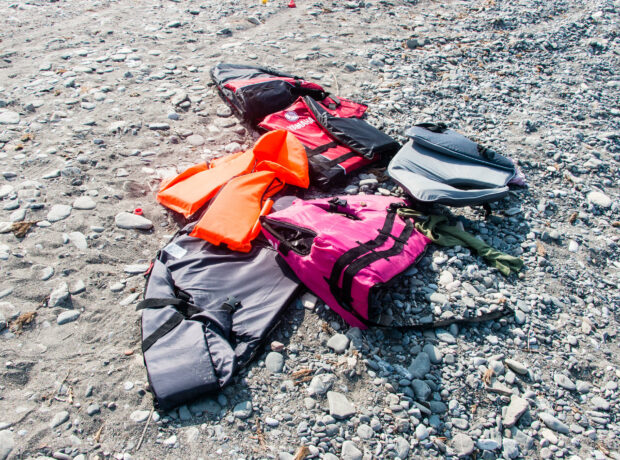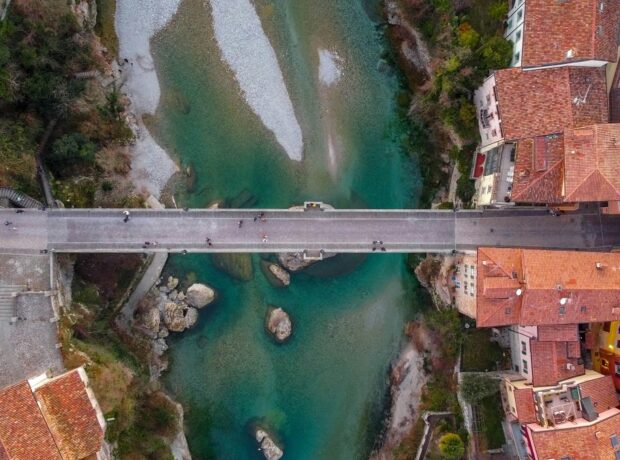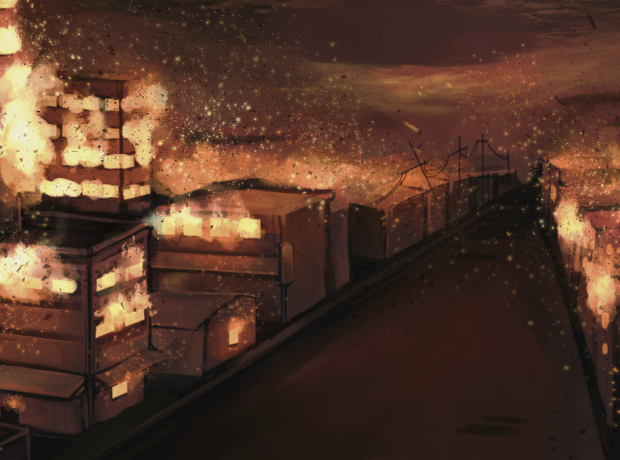Each day, thousands of “cargo women” risk their lives in stampedes and crowd surges on the Spain-Morocco border leaving Ceuta. Weighed down with heavy bales, they live under the burden of exploitation, putting their health and their lives in danger.
Ceuta is a tiny Spanish territory on the north coast of Morocco, 18 miles (29km) across the water from Gibraltar. A fence separating Africa from this little crop of Europe surges upward like a scar from the Mediterranean Sea. It cuts the beach in two, snaking across the green hills behind.
It is 5am when Soad, 22, and her sister Umeima, 20, get out of a taxi. They have come from Fnideq, a Moroccan village only 5 miles (7km) away. They wait in the dark for the border gate to open so they can cross to Ceuta, with a few men and hundreds – maybe even thousands – of other women, mostly dressed in traditional North African djellabas.
The sooner they get to the other side, the more chance they have of finding a bale of goods at Ceuta’s industrial area. Each bale weighs 50-80kg (110-175lb) . If they can manage to get a bale and cross through the border gate again, back into Morocco, they receive around €20 (£17) for their efforts. If they’re lucky and things go smoothly, they can make the trip twice.
Suddenly the gates open.
“Everybody started pushing and shoving, trying to jump the queue”, Umeima remembers. “Some men literally jumped over the crowd, trying to be first at the gate. When they fell back down again, they stepped on the women”.
Military police use their batons and belt buckles to try to restore order. The policemen hit the sisters, but the women can’t stop moving forward, pushed on by the crowd behind them. Umeima is separated from her sister.
“She was trapped between two bodies. Then the police closed the gate and started raining blows on anything that was moving,” says Umeima. Soad falls down and hits the concrete floor.
Umeima finds her sister, but she has suffered a blow to her head when she hit the ground and cannot continue across the border. “So, we went back home,” explains Umeima. “We stopped at the doctor’s, who gave her an injection, took an x-ray image of her head and said she was all right. But when we got home, the pain continued. She couldn’t sleep at all because of the headache.”
Soad’s family have been living in the Condesa neighbourhood of Fnideq (Morocco) for many years. This neighbourhood is full of narrow alleys and blue-painted houses. It has grown a lot in recent years. People are attracted by the lure of the jobs created around the border trade. Most of them try to achieve legal residency in the border province of Tétouan. This allows them to get into Ceuta without a visa, and to work there for the day. It is made possible by an exception granted by Spain and the EU as part of the Schengen Agreement.
The day after the incident Soad’s headache has not subsided, so she and her sister go back to the doctor. He insists that she is rushed to Tétouan’s hospital. She is pronounced dead on arrival.
There is an autopsy. A note from the Moroccan Health Ministry says that Soad has died due to complications from a heart attack she suffered at the border. But her family does not believe this.
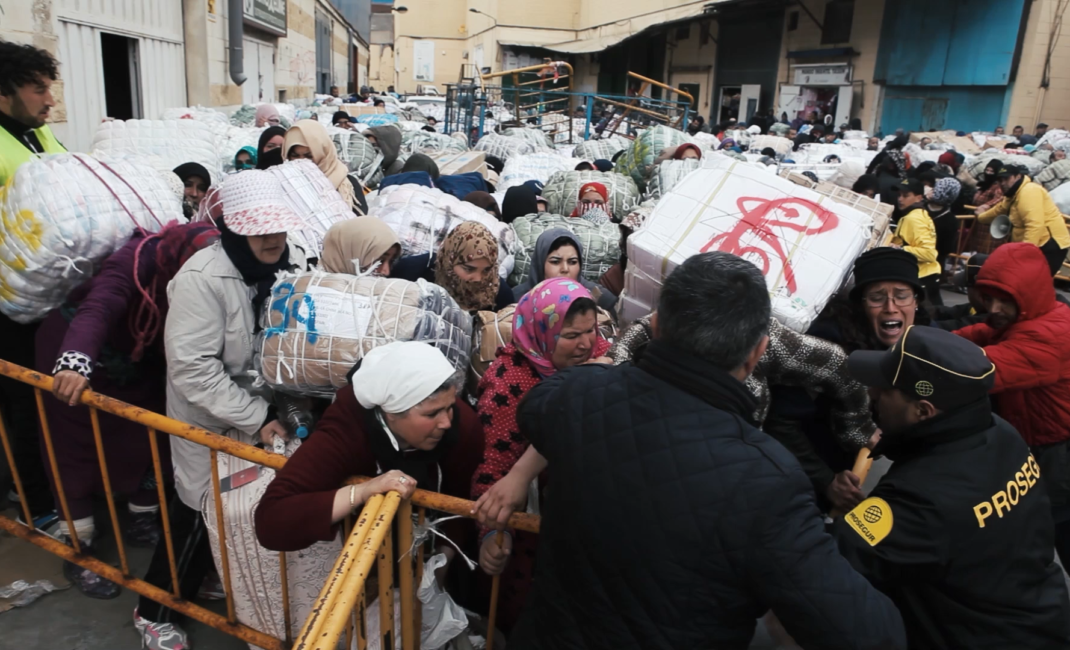
Women surge against metal railings hemming them in as they try to cross the border from Ceuta into Morocco.
“The x-ray images from the same day that she was trampled upon were never handed to us,” says Umeima. “Neither was the coroner’s report. She was never ill or had any sort of heart problem.” The only heart that is broken, Umeima says, is hers, shattered by her sister’s death.
Soad was divorced. She had a four-year-old son. According to the family, she had previously worked at her uncle’s bakery. But the boy’s father, who didn’t make any maintenance payments, wouldn’t allow her to work serving the public. So she quit the job. Soon she started carrying bales across the border. She had been doing it for a month when she died.
Soad was not the only woman to lose her life last year as a result of the daily stampedes on the Moroccan side of the border. On April 24, only a month later, the same thing happens again. Batul, 42, from the Tlata Tagramt tribe, no more than 18 miles (30km) away from Ceuta, is crushed to death in another stampede. Mustafa, her brother, tells EFE news agency that she died from injuries to her head, after she was trampled upon by the crowd.
On August 28, two women, aged 34 and 45, were trampled at the Tarajal 2 border post and rushed to hospital where they died of their injuries. So far this year, two more women have lost their lives, after a stampede on January 15, and a man was killed a week later crossing the border at Melilla, a second Spanish enclave 200 miles (350km) south-east of Ceuta.
Unofficially, these “porters” insist that the border has taken the life of many more women. These are just the ones whose stories have made it to the international media.
“The Moroccan government and police threaten the families not to speak out”, says one so-called porter. The porters (sometimes called “cargo women” or “mule women”) say that the same day that Batul died, another woman, Karima, a 54-year-old mother of six, was crushed to death in another stampede. They say the legs of another woman, Lubna, were also broken.
Why are these goods carried on the backs of these women? Why is this trade not properly regulated, providing job security and safe conditions for the porters?
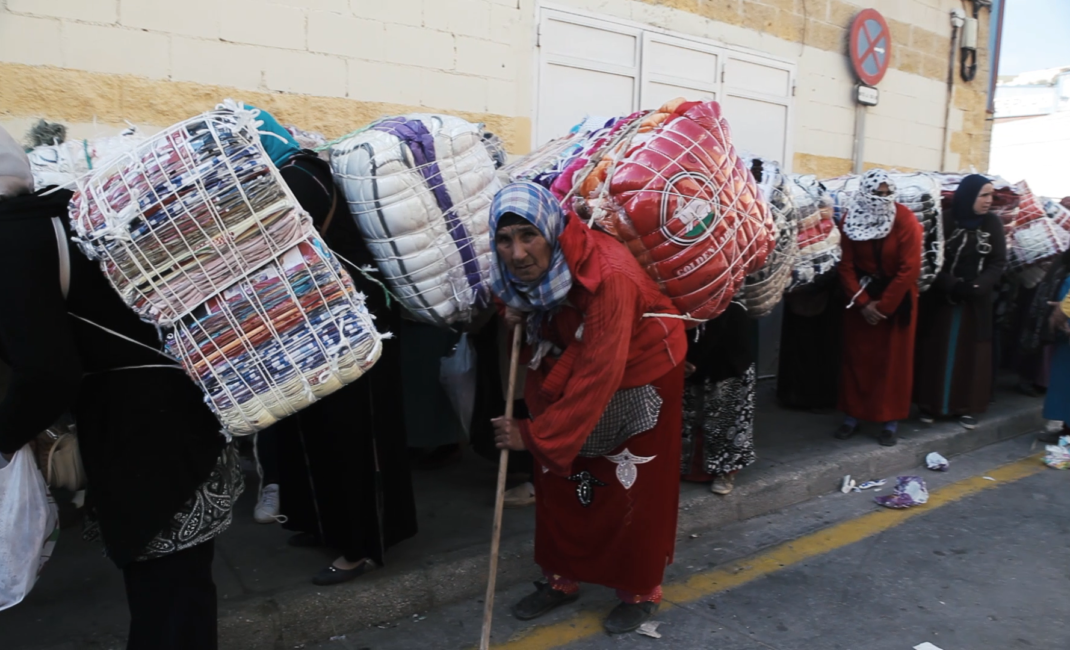
A woman stands with the help of a stick, carrying a heavy bale on her back at the Ceuta border crossing
Since the 19th century, Ceuta has been exempted from most Spanish national taxes. That means there is no VAT. Instead there is a much lower Tax on Products, Services and Imports (IPSI, in its acronym in Spanish). When Spain joined the EU in 1986, it demanded that Ceuta was excluded from the EU Customs Union. Spain’s aim was to obtain advantages for the Spanish enclave in terms of lower tariffs for trade with neighbouring Morocco. But Morocco refuses to officially acknowledge Spanish sovereignty over Ceuta. And so the border crossing into Morocco is not actually a border for trade purposes.
But the Moroccan government doesn’t consider anything that someone carries on their own body as imported goods. Instead, these are deemed as personal effects. All this means that it is cheaper for traders from anywhere in the world to get their goods into Morocco through Ceuta as long as those goods are carried by the porters.
“Atypical” trade makes up 70% of Ceuta’s economic activity. Xavier Ferrer-Gallardo, an independent researcher, calculates that in 2015, 25.7% of the town’s income came from the IPSI tax and 46% of Ceuta’s imports were later exported to Morocco. That trade adds up to more than €400 million (£350m or $500m) every year.
Morocco tolerates this “trade” because it provides an income to many in the northern part of the country, an area traditionally neglected by the government in Rabat. The American Chamber of Commerce in Casablanca estimates that 45,000 people live directly off this trade, while another 400,000 may benefit from it, indirectly. If this form of commerce was done away with, significant social tensions might follow.
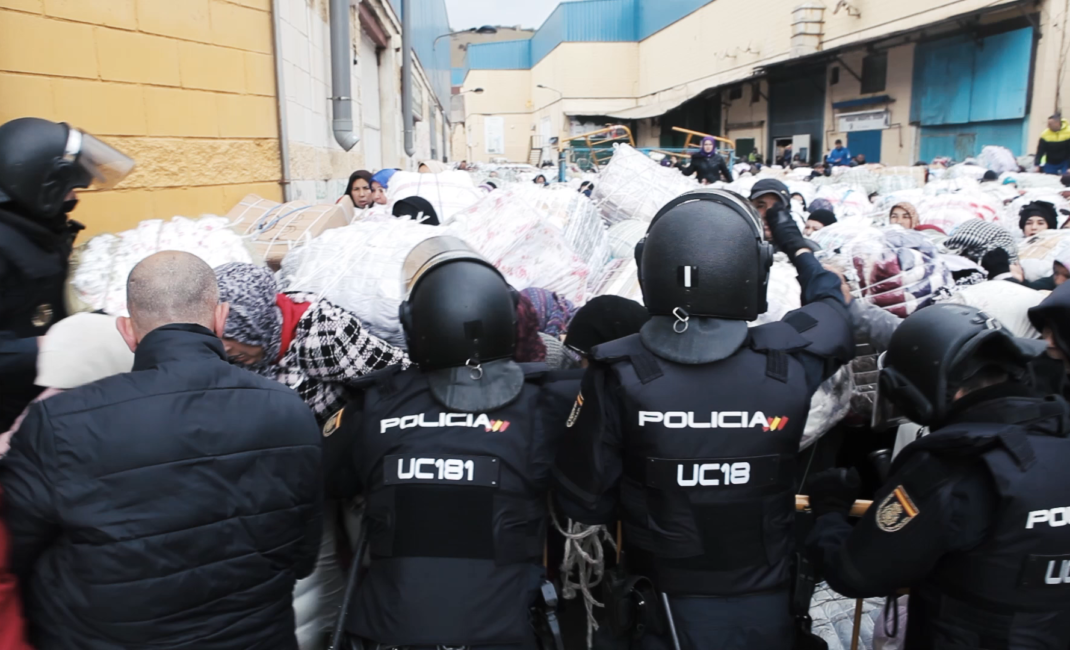
Police hold the surging crowd of women back at the border in Ceuta
…
The traders at Ceuta’s industrial area are nearly all male, as are the clients at the other side of the border and the dock workers that unload the goods. But most porters are women. The toughest part of this multi-million euro trade falls, literally, on women backs.
According to this report, 80% of the women in Fnideq (Morocco) work in Ceuta, with 25% of them in domestic service and the other 75% as either porters or sex workers. The porters are predominantly women of 35 to 60 years old, most of them single mothers, divorced or widowed. Some of them are married.
Most of the women are uneducated and have no other way of getting into the labour market. More than 80% of women in this part of Morocco can’t read or write.
Asma, a 24-year-old porter, goes to the border every day from Tétouan, in Morocco. “I’ve left my phone number and CV everywhere, but no one has called,” she says. She trained as a hair stylist, but she’s out of work, so she tried her luck at the border. “I’m married, with three daughters, and this is the only thing that allows me to pay the €100 rent and repay a loan that I borrowed to buy the furniture.
“My husband is unemployed. So I’m the one providing for the family. He hasn’t got a passport to cross the border. He could apply for one, but he won’t do it. The problem is not so much that he doesn’t work, but that he insults me and beats me, sometimes. I’ll leave him when my daughters are older,” she says resolutely.
Leaning on a crutch, Asma walks slowly alongside the warehouses in Ceuta’s industrial area. She limps from a sprained ankle she got in one of the daily stampedes. “I’m happy today, because they’re paying between €25 and €35 per bale, and they’re not too heavy,” she says. She negotiates a price with the traders, always smiling.
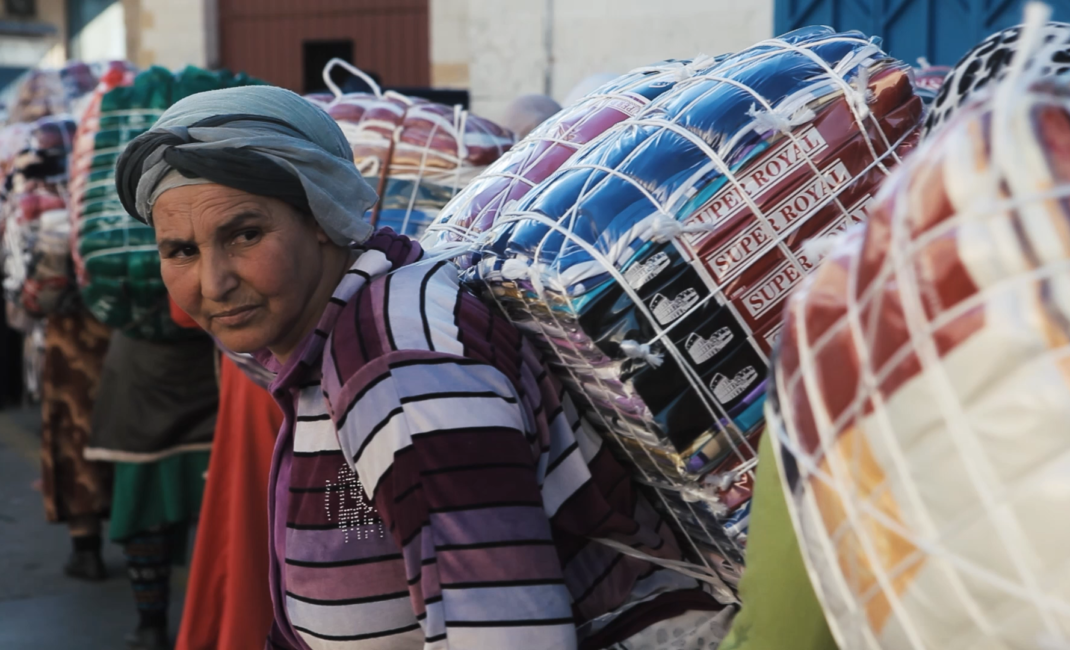
Crossing the Morocco-Spain border at Ceuta
On the Spanish side of the border, the police set up queuing areas, demarcated by portable fences, and stretch the lines to prevent large crowds. This doesn’t completely stop stampedes when the queue is too slow and the police won’t hesitate in using their batons. But it’s down in the town of Ceuta where the biggest problems are.
Because Ceuta’s industrial area is located on private land, the police intervene only in certain situations, while the owners of the warehouses are required to hire their own private security.
Currently, the security of the border crossing at Ceuta is managed by 12 private guards. Four thousand porters cross this border every day.
Alí Ayad, one of the traders, says: “Most of the goods carried by the women come from illegal warehouses, so it is not fair to expect the rest of us to pay for the private security.” A report by Asociación Pro Derechos Humanos De Andalucía (APDHA) confirms that some warehouses “are no more than unregistered depots for imports from traders working out of Casablanca, Tangiers, Barcelona, Brussels or Shanghai. They buy them through front men to store the goods, but not for any legitimate trade. Once the goods are on the other side of the border, they will continue their way through Africa, not having paid any tariffs, without having to formally hire the porters or to pay taxes for their business”.
APDHA’s annual report insists on the urgent need for measures to protect the porters. Trolleys or conveyor belts should be allowed at the border crossing to carry the goods. An upper limit of around 20kg (44lb) should be imposed on the bales. Some facilities, such as rest rooms, benches and shaded areas, should be built to improve the working safety of the porters and to cater for their basic needs as they wait, often for long periods. And, above all, the work of the porters should be regulated, so their basic labour rights are guaranteed.
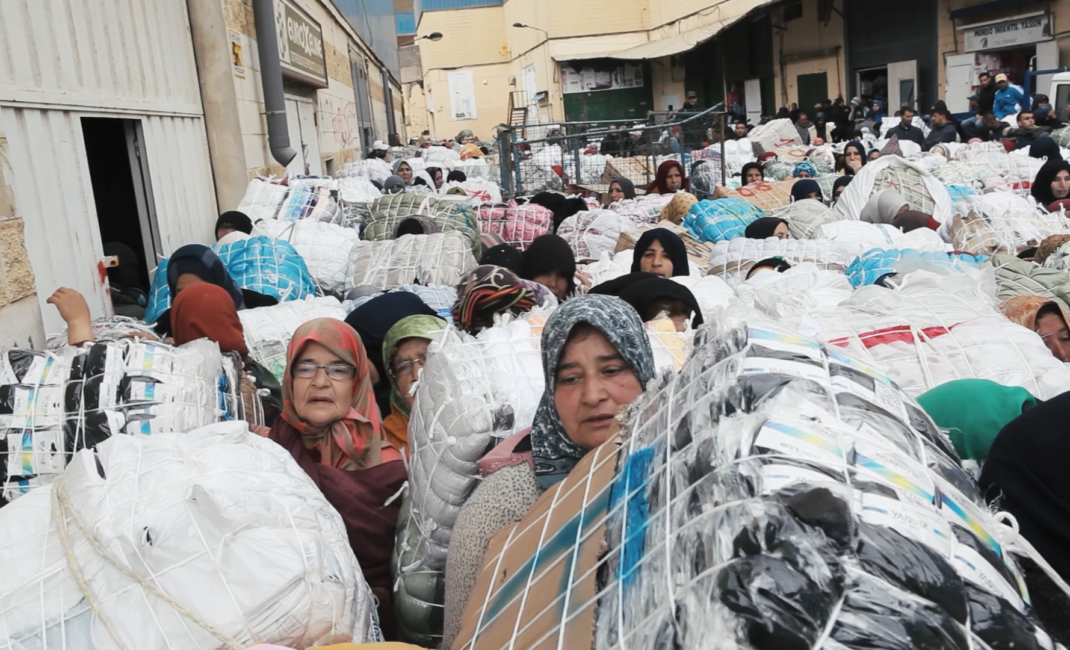
Crossing the Morocco-Spain border at Ceuta
***
When Asma joins the queue to go back to Morocco, it is short and orderly. An hour later, it has swelled to become a huge crowd. When the police open the gate, groups of women, one after the other, try to jump their place in the queue. So Asma joins in. “I’ve come all this way to get money. I can’t go back home empty handed,” she says.
Two men are arguing about who is first. The police are shouting for everyone to calm down, but no one is listening. The crowd is getting restless.
Then, the police close the gate, crushing everyone in the first row, while those at the back continue pushing. Asma falters and falls to the ground.
A man comes rushing to her with a knife and cuts the bale free from her back. Asma’s eyes are closed. She is turned on her side by a group of people and someone calls an ambulance. But soon she is back up on her feet. She’s been lucky today. She only fainted.
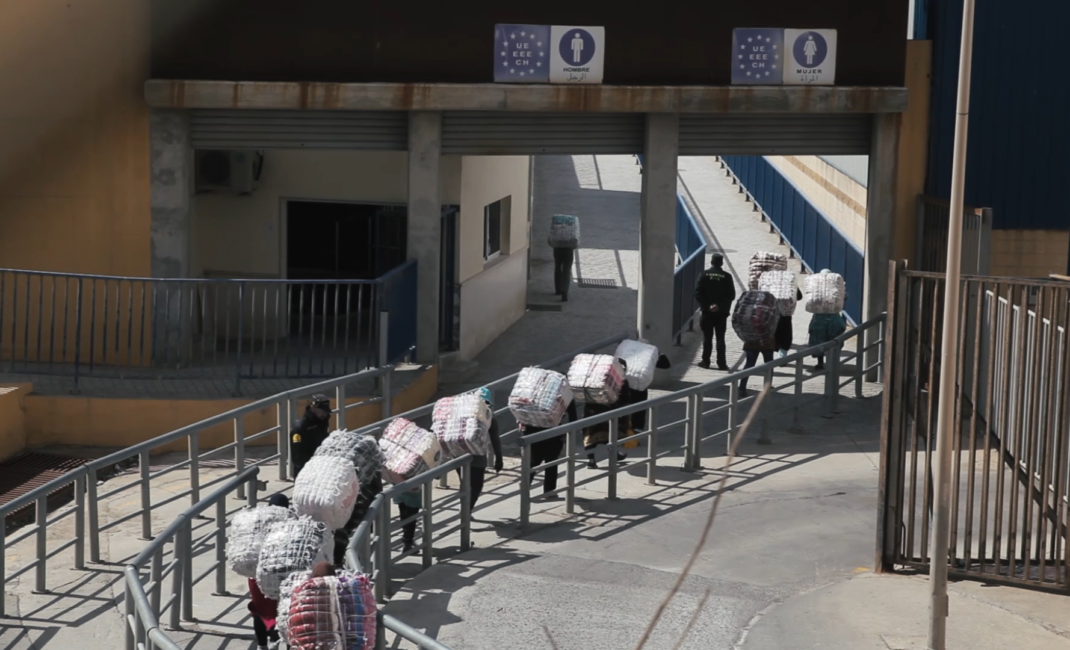
A line of women hunched over with heavy bales on their backs walk through border controls at Ceuta
For more content like this subscribe here and like our Facebook page.

